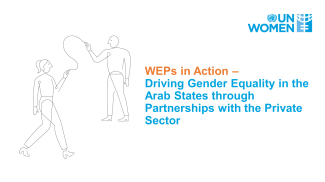
UN Women in the Arab States region promotes and implements a holistic approach in its Women’s Economic Empowerment (WEE) programming. This approach includes interventions that leverage partnership eco-systems with governments, civil society organizations, academia, the United Nations and other development partners with the aim of highlighting the role of the private sector to promote safe and decent working opportunities for women and increase sourcing from women suppliers.

In 2021, UN Women Regional Office for Arab States (ROAS) developed a Regional Strategy on the Women’s Empowerment Principles (WEPs), to guide the implementation of work with the private sector, with a focus on increasing decent employment opportunities for women through transformative partnerships, moving away from transactional (activity-based) ones towards value creating and innovative collaborations.
While the strategy was only operationalized in 2021, as of 2019 the number of companies joining the WEPs has been increasing at a staggering rate, from 174 signatories at the end of 2018 to 618 by end of 2023. And this is only how the story starts!
Based on the strategy and the focus on providing tailored support to the private sector in the region, UN Women ROAS developed two service lines on (i) Gender Responsive Marketing (WEPs 5) and (ii)) Sexual Harassment in the World of Work[1](WEPs 3) that were piloted and launched across the region during 2023. The objective of the gender-responsive marketing toolkit is to provide practical guidance, self-assessment tools, detailed checklists and best practices to companies of all sizes and industries on how to design, roll out and measure the impact of their marketing and advertising campaigns and initiatives with a gender lens. The Sexual Harassment in the World of Work Toolkit on the other hand, provides private sector companies in the Arab region with assessable, easy-to-understand guidance on how to effectively prevent and respond to violence and harassment in the workplace.

An anonymous survey conducted by ROAS in 2023 and answered by 135 companies revealed that 78 per cent of these companies reported an increase in the recruitment of women within the private sector in the last 12 months (after their engagement with WEPs). Furthermore, 70 per cent of enterprises retained their female employees following maternity leave. Additionally, a significant 87 per cent of these companies attributed these positive changes, to varying degrees, to the support provided by UN Women. This survey aimed at tracking progress, evidence and reporting changes within the firms as a part of joining UN Women’s ‘WEPs journey’.
While the evidence collected indicates that most signatories are still in the early stages of their ‘journey’, some of them have already implemented measures to facilitate progress. For instance, 36 per cent of these companies have advanced in improving workplace protection and safety through the development and adoption of policies, along with employee trainings. Additionally, 41 per cent of the companies have taken steps to establish or enhance work-life balance, benefiting both women and men in their workforce.

Currently UN Women ROAS is developing an evaluation tool to assess progress and impact of the private sector WEPs signatories on the implementation of their gender equality commitments at the workplace. The tool will ensure that good practices are captured and promoted; performance monitoring is supported in such a way that companies are able to track progress against key performance indicators; and that their gender equality commitments are recognized.
[1] In partnership with the ILO, a combined toolkit was developed that merges the ILO Employers’ Guide and the UN Women’s Self-Assessment tool. This interagency collaboration sought to provide a combined, cohesive product for the private sector’s reference.
